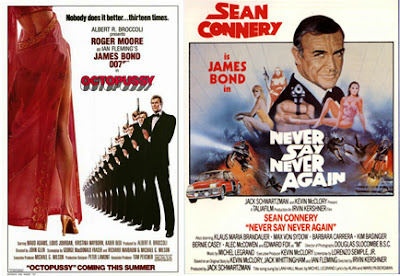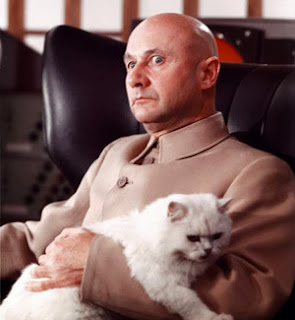After a lengthy and storied legal history, the Bond producers and studio have secured rights to both Ernst Stavro Blofeld, Bond's arch-nemesis, and the evil organization he leads, SPECTRE. This suggests that both elements could make a return to the upcoming iterations of the Bond franchise, perhaps as soon as the next film, Bond's twenty-fourth.
The first Bond film, 1962's Dr. No, made clear that Bond wasn't just going to practice Cold War spycraft and espionage; there were bigger threats out there. By the end of the movie, he knows of a global villainous organization called SPECTRE that is counter to his own and the entire world's intelligence services and is hiding in and striking from the shadows. There was, in fact, a whole hierarchy of numbered baddies, who were slowly revealed to us over the course of Sean Connery's run as Bond. Blofeld, the puppetmaster himself, wasn't revealed until 1967's You Only Live Twice, first portrayed by Donald Pleasance. (No actor played Blofeld twice.) Of course, the world of James Bond appeared in novels nearly a decade before he appeared onscreen, and that's where these troubles start.
 |
| SPecial Executive for Counterintelligence, Terrorism, Revenge and Extortion (Bad guys and their acronyms, am I right?) |
Ian Fleming, creator of James Bond, published the first novel featuring that character in 1953 with Casino Royale. By 1958, there were possibilities of a filmed adaptation of 007's exploits, and Fleming began crafting a Bond story intended to be a screenplay for the potential movie—and in doing so, worked with a number of people, including a young writer-director named Kevin McClory.
The film fell through, but Fleming pursued the story and eventually novelized it as Thunderball, released in 1961. McClory, who went uncredited, had been instrumental in developing the story and characters and immediately filed suit against Fleming, winning in court. Producer Albert “Cubby” Broccoli and Eon Productions obtained limited rights to the story from McClory, which became the 1965 Thunderball film. McClory never quite gave up on 007, however, and after announcing plans to move ahead with a Bond film in the 1980s found himself the subject of another lawsuit, this time filed by United Artists and Fleming's estate. McClory won again, and went on to contribute to one of the odder chapters in Bond history.
Sean Connery felt he was done with Bond by the time he finished 1967's You Only Live Twice, his fifth film as Bond. For the next film, 1969's On Her Majesty's Secret Service, he was replaced by Australian model George Lazenby, the perhaps unfairly maligned one-shot Bond. A $1 million payday, the largest sum ever paid to an actor at the time, brought Connery back for his last official Bond film: 1971's Diamonds Are Forever.
 |
| Apparently it takes a hall of mirrors' worth of Roger Moores to add up to one middle-aged Sean Connery. |
So what does all this mean, now that Blofeld and his people are back under the Eon roof? The rebooted Bond franchise introduced QUANTUM in 2008's Quantum of Solace as the modern version of an evil organization pitted against Bond. They were, however, totally ignored by the next film in the franchise, 2012's excellent Skyfall. Daniel Craig is contracted for five films, two fewer than Roger Moore's current record of seven, and we've seen only three. Some speculations can be made here.
First, will SPECTRE and Blofeld reappear in future Bond films? Almost a foregone conclusion. Eon and MGM wouldn't have made an announcement detailing the procurement of these properties unless they had plans for them. It's a tease as much as anything. Moreover, it's clear the most recent Bond films have no problem echoing elements of, or paying homage to, the classic Bond films of yesteryear. Given that QUANTUM failed to show up to Skyfall, I don't think it's farfetched to think they'll be done away with in favor of SPECTRE in the new series.
Second, consider the creative sources—especially Skyfall director Sam Mendes, who has made no secret of his love for the franchise. Mendes was reported to be done with Bond after Skyfall finished, having put all his efforts into the “Bond film he wanted to make.” He out-and-out said that he wasn't going to be involved with the next film, which proved false when he eventually was announced as the man in the director's chair for Bond 24.
 |
| "I may have had something to do with that." |
Although Mendes did initially discount the idea of returning as director, there's more to his quote above. Having put “everything [he] possibly could” into Skyfall, he said, “If I felt I could do the same again, then absolutely I would consider doing another one. But it is a big task and I wouldn't do it unless I felt I could.” Since he's onboard, I guess he feels he could, which can only be good news to fans. As to how the production will deal with the availability of Blofeld and SPECTRE, that is anyone's guess. Yet allow me to indulge in a little more speculation, and if you haven't seen Skyfall, spoilers follow.
MI6 is in transition by the end of Skyfall. Judi Dench's M was killed, and there's a new M played by Ralph Fiennes. Q Branch is back. So is Moneypenny. “Welcome to the new MI6,” M's chief of staff says to Bond at one point. It's seemingly a pivot back toward some recognizable features from 007's earliest days. What better way to break in the revamped MI6 than with a new and organized global terror threat?
 |
| "I'd really rather you didn't." |
To best deal with the situation, I propose this: QUANTUM basically eats itself, from the inside. A radical, more dangerous faction from within QUANTUM rebels and takes over the organization, raising SPECTRE in its place. Bond and MI6 try to keep up as their enemies draw battle lines, maybe even planning to take both down at once, but they underestimate the brilliant and ruthless leadership of the new terror group—one Ernst Stavro Blofeld—setting up a worthy adversary for Bond once again, possibly for years to come.
Make some speculations of your own—are you excited for the possibility of more SPECTRE? Would you rather they play out their QUANTUM hand, first? Do you not even care about James Bond? Why are you reading this article, then? Sound off below!





